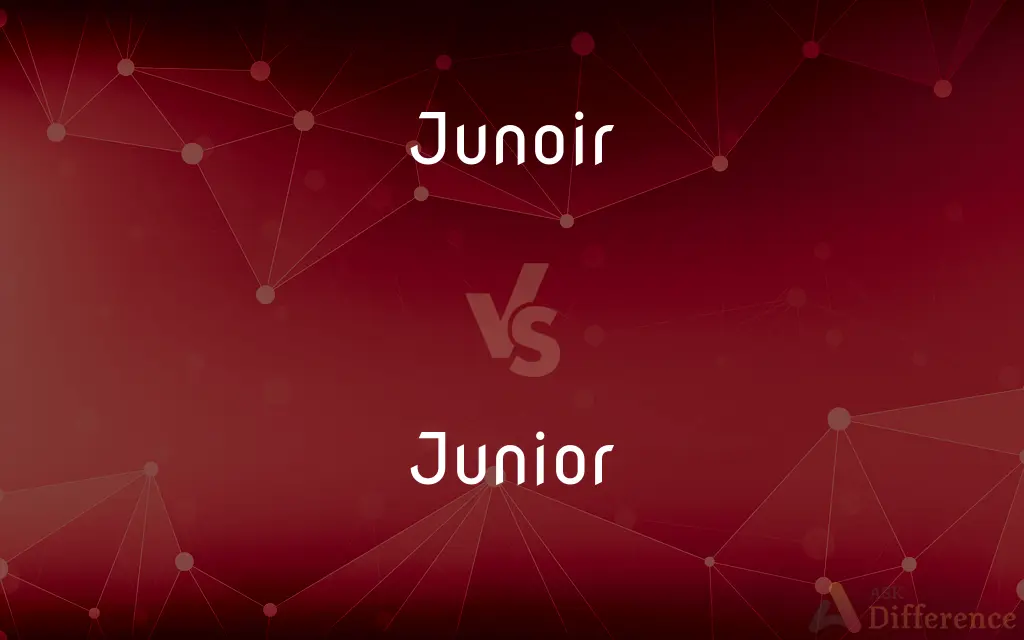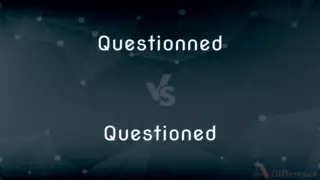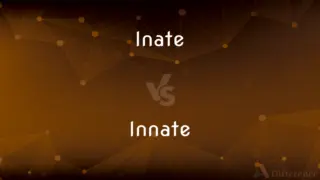Junoir vs. Junior — Which is Correct Spelling?
By Tayyaba Rehman — Updated on April 4, 2024
"Junoir" is the incorrect spelling. The correct spelling is "Junior," denoting someone younger or a lower rank.

Table of Contents
Which is correct: Junoir or Junior
How to spell Junior?

Junoir
Incorrect Spelling

Junior
Correct Spelling
ADVERTISEMENT
Key Differences
Associate "Junior" with "younger" – both start with a 'ju' sound.
The word "Junior" is similar to "June," a month, but with an "ior" at the end.
Think of senior and junior, both ending with "ior."
Remember that there is no extra 'o' in "Junior."
Recall that "Junior" often comes after "Senior," and neither has an extra 'o.'
ADVERTISEMENT
How Do You Spell Junior Correctly?
Incorrect: I'm looking forward to the juinoir prom next spring.
Correct: I'm looking forward to the junior prom next spring.
Incorrect: The juinoir senator from Vermont spoke at the event.
Correct: The junior senator from Vermont spoke at the event.
Incorrect: He plays for the juinoir soccer team.
Correct: He plays for the junior soccer team.
Incorrect: My sister is in her juinoir year of college.
Correct: My sister is in her junior year of college.
Incorrect: Juinoir High School is where I'm studying right now.
Correct: Junior High School is where I'm studying right now.
Junior Definitions
A person who is younger than another.
He is my junior by two years.
A child or young person.
Safety precautions are a must for juniors.
Lower in rank or position.
She is a junior executive at the company.
Abbr. Jr. Used to distinguish a son from his father when they have the same given name.
Intended for or including youthful persons
A junior sports league.
Lower in rank or shorter in length of tenure
A junior officer.
The junior senator.
Of, for, or constituting students in the third year of a US high school or college
The junior class.
Lesser in scale than the usual.
A person who is younger than another
A sister four years my junior.
A person lesser in rank or time of participation or service; subordinate.
A student in the third year of a US high school or college.
A class of clothing sizes for girls and slender women. Also called junior miss.
(comparable) Low in rank; having a subordinate role, job, or situation.
Younger.
(not comparable) Belonging to a younger person, or an earlier time of life.
Of or pertaining to a third academic year in a four-year high school (eleventh grade) or university.
A younger person.
Four years his junior
A name suffix used after a son's name when his father has the same name (abbreviations: Jnr., Jr., Jun.).
A third-year student at a high school or university.
(legal) A junior barrister.
Less advanced in age than another; younger. Abbreviated Jr.
Lower in standing or in rank, or having entered later into a position or office; as, a junior partner; junior counsel; junior captain; the junior Senator from New York.
Belonging to a younger person, or an earlier time of life.
Our first studies and junior endeavors.
One of a lower or later standing; specifically, in American colleges and four-year high schools, one in the third year of his course, one in the fourth or final year being designated a senior; in some seminaries, one in the first year, in others, one in the second year, of a three years' course.
Term of address for a disrespectful and annoying male;
Look here, junior, it's none of your business
A third-year undergraduate
The younger of two men
A son who has the same first name as his father
Younger; lower in rank; shorter in length of tenure or service
Used of the third or next to final year in United States high school or college;
The junior class
A third-year student
Including or intended for youthful persons;
A junior sports league
Junior fashions
A second-year student in a three or four-year course, especially in high school or college.
She's in her junior year of college.
Of, for, or denoting young or younger people.
He plays for the junior team.
Junior Meaning in a Sentence
She was elected junior class president last week.
My brother is a junior at Lincoln High School.
We're going to the junior prom together.
The junior varsity team has a game on Friday.
He's reading at a junior high level.
The science club is open to all junior members.
The junior senator has been very active in the community.
She's taking the junior lifeguarding course this summer.
Our junior scouts will be camping this weekend.
Our team won the junior league championship.
As a junior firefighter, he learns a lot about safety.
The library has a section for junior readers.
He's already a junior partner at the law firm.
He's competing in the junior division of the tournament.
She plays the flute in the junior band.
The junior sailing camp starts in July.
The junior math competition is next month.
The junior detective kit was his favorite birthday gift.
She's looking forward to her junior year abroad in France.
The junior chess club meets every Wednesday after school.
The junior choir will perform at the school concert.
Our project won first place in the junior science fair.
Common Curiosities
Why is it called Junior?
Derived from Latin, "Junior" means "younger" and denotes someone or something of lower rank or position or less advanced age.
What is the root word of Junior?
The root word for "Junior" is the Latin word "juvenis," meaning "young."
What is the pronunciation of Junior?
Junior is pronounced as "JOON-yer."
What is the verb form of Junior?
There isn't a verb form for "Junior."
Which vowel is used before Junior?
Typically, the indefinite article "a" is used before "Junior."
What is the singular form of Junior?
The singular form is "Junior."
Which preposition is used with Junior?
Various prepositions can be used with "Junior," but "to" is common, as in "junior to him."
What is the plural form of Junior?
The plural form is "Juniors."
Is Junior an adverb?
No, "Junior" is not an adverb.
Is Junior an abstract noun?
No, "Junior" is a concrete noun when referring to a person but can be abstract when denoting rank or position.
Which conjunction is used with Junior?
Any conjunction can be used with "Junior" depending on the context; "and" is common, e.g., "Senior and junior members."
Is Junior a negative or positive word?
"Junior" is a neutral word but may carry positive or negative connotations based on context.
Is Junior a vowel or consonant?
"Junior" is a noun composed of both vowels and consonants.
Is Junior a collective noun?
No, "Junior" is not a collective noun.
Is Junior a countable noun?
Yes, "Junior" is a countable noun.
Is the Junior term a metaphor?
"Junior" can be used metaphorically to refer to someone who is inexperienced or new in a particular field.
Is the word Junior is imperative?
No, "Junior" is not an imperative verb.
What part of speech is Junior?
"Junior" can be both a noun and an adjective.
What is another term for Junior?
Understudy, subordinate, or apprentice can be used in certain contexts.
How many syllables are in Junior?
Junior has two syllables.
How do we divide Junior into syllables?
Ju-nior.
What is the opposite of Junior?
The opposite of "Junior" is "Senior."
Which determiner is used with Junior?
Determiners such as "this," "that," "my," "our" can be used with "Junior" depending on the context.
What is the first form of Junior?
As a noun, the base form is "Junior."
What is the second form of Junior?
Junior doesn't have verb forms, so it remains "Junior."
What is the third form of Junior?
Again, as a noun, "Junior" doesn't have verb forms.
Which article is used with Junior?
Both definite ("the") and indefinite ("a/an") articles can be used, depending on the context.
Is Junior a noun or adjective?
"Junior" can function as both a noun and an adjective.
What is a stressed syllable in Junior?
The first syllable, "Ju," is stressed.
How is Junior used in a sentence?
She was promoted from a junior analyst to a senior position within a year.
Share Your Discovery

Previous Comparison
Questionned vs. Questioned
Next Comparison
Inate vs. InnateAuthor Spotlight
Written by
Tayyaba RehmanTayyaba Rehman is a distinguished writer, currently serving as a primary contributor to askdifference.com. As a researcher in semantics and etymology, Tayyaba's passion for the complexity of languages and their distinctions has found a perfect home on the platform. Tayyaba delves into the intricacies of language, distinguishing between commonly confused words and phrases, thereby providing clarity for readers worldwide.


































